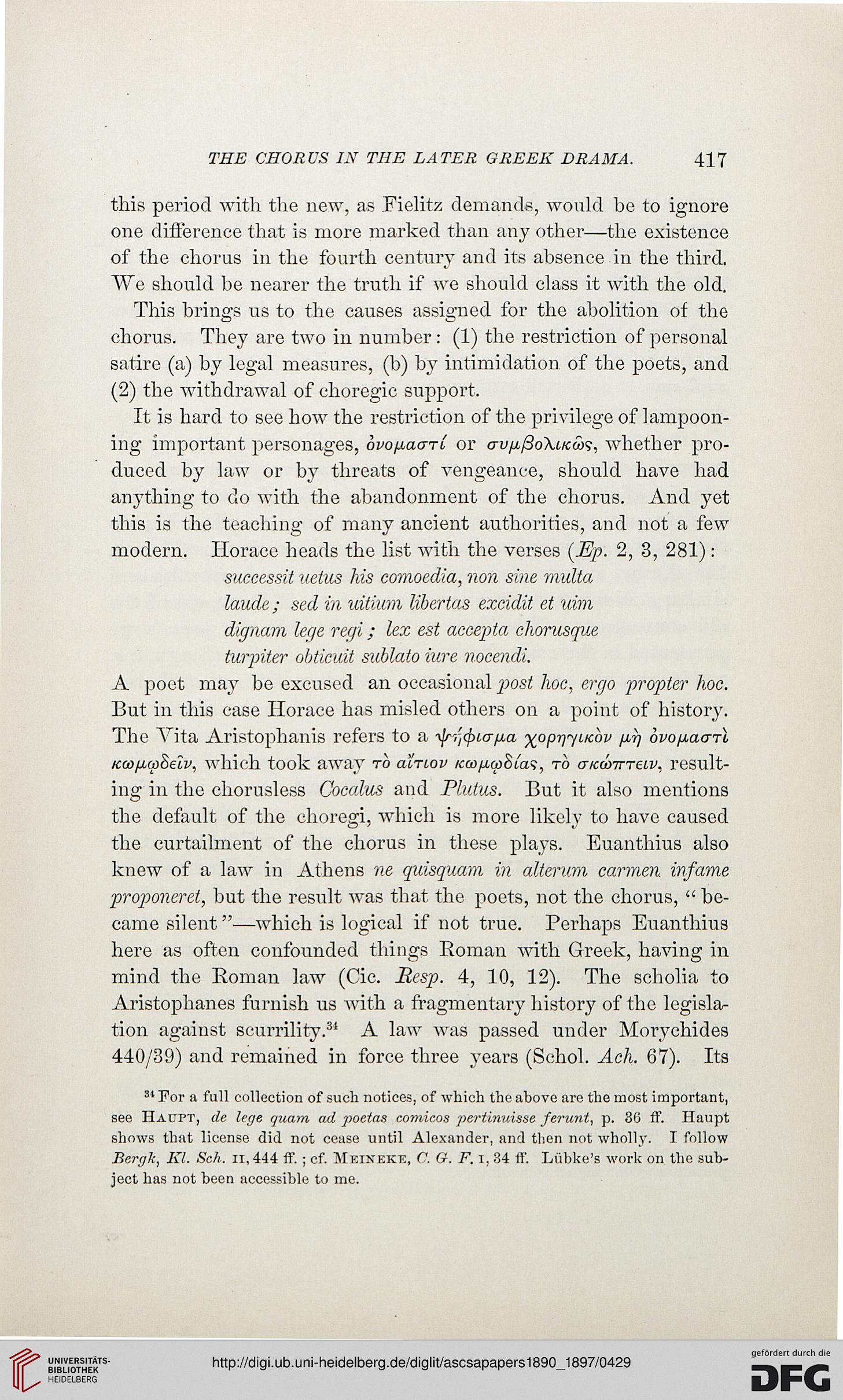THE CHORUS IN THE LATER GREEK DRAMA.
417
this period with the new, as Fielitz demands, would be to ignore
one difference that is more marked than any other—the existence
of the chorus in the fourth century and its absence in the third.
We should be nearer the truth if we should class it with the old.
This brings us to the causes assigned for the abolition of the
chorus. They are two in number: (1) the restriction of personal
satire (a) by legal measures, (b) by intimidation of the poets, and
(2) the withdrawal of choregic support.
It is hard to see how the restriction of the privilege of lampoon-
ing important personages, bvo^ao-rL or <tv/jl(3o\iku)<;, whether pro-
duced by law or by threats of vengeance, should have had
anything to do with the abandonment of the chorus. And yet
this is the teaching of many ancient authorities, and not a few
modern. Horace heads the list with the verses (JEp. 2, 3, 281):
successit uetus his comoedia, non sine multa
laude; sed in uitium libertas exeidit et uim
dignam lege regi; lex est accepta chorusque
turpiter obticuit sublato iure nocendi.
A poet may be excused an occasional ]wst hoc, ergo propter hoc.
But in this case Horace has misled others on a point of history.
The Vita Aristophanis refers to a "tyrfyio-jxa ^opvyiKov /jltj ovofxao-rl
Ku>/j.(p8eiv, which took away to aiTiov KcofxusBi'av, to o-ku>tttziv, result-
ing in the chorusless Cocalas and Plutus. But it also mentions
the default of the choregi, which is more likely to have caused
the curtailment of the chorus in these plays. Euanthius also
know of a law in Athens ne quisquam in alterum cminen infame
proponeret, but the result was that the poets, not the chorus, " he-
came silent"—which is logical if not true. Perhaps Euanthius
here as often confounded things Roman with Greek, having in
mind the Roman law (Cic. Rcsp. 4, 10, 12). The scholia to
Aristophanes furnish us with a fragmentary history of the legisla-
tion against scurrility.34 A law was passed under Morychides
440/39) and remained in force three years (Schol. Ach. 67). Its
31 For a full collection of such notices, of which the above are the most important,
see Haupt, de lege guam ad poetas comicos pertinuisse ferunt, p. 30 ff. Haupt
shows that license did not cease until Alexander, and then not wholly. T follow
Bergk, Kl. Sch. n, 444 ff. ; cf. Meineke, C. &.F.1, 34 ft". Liibke's work on the sub-
ject has not been accessible to me.
417
this period with the new, as Fielitz demands, would be to ignore
one difference that is more marked than any other—the existence
of the chorus in the fourth century and its absence in the third.
We should be nearer the truth if we should class it with the old.
This brings us to the causes assigned for the abolition of the
chorus. They are two in number: (1) the restriction of personal
satire (a) by legal measures, (b) by intimidation of the poets, and
(2) the withdrawal of choregic support.
It is hard to see how the restriction of the privilege of lampoon-
ing important personages, bvo^ao-rL or <tv/jl(3o\iku)<;, whether pro-
duced by law or by threats of vengeance, should have had
anything to do with the abandonment of the chorus. And yet
this is the teaching of many ancient authorities, and not a few
modern. Horace heads the list with the verses (JEp. 2, 3, 281):
successit uetus his comoedia, non sine multa
laude; sed in uitium libertas exeidit et uim
dignam lege regi; lex est accepta chorusque
turpiter obticuit sublato iure nocendi.
A poet may be excused an occasional ]wst hoc, ergo propter hoc.
But in this case Horace has misled others on a point of history.
The Vita Aristophanis refers to a "tyrfyio-jxa ^opvyiKov /jltj ovofxao-rl
Ku>/j.(p8eiv, which took away to aiTiov KcofxusBi'av, to o-ku>tttziv, result-
ing in the chorusless Cocalas and Plutus. But it also mentions
the default of the choregi, which is more likely to have caused
the curtailment of the chorus in these plays. Euanthius also
know of a law in Athens ne quisquam in alterum cminen infame
proponeret, but the result was that the poets, not the chorus, " he-
came silent"—which is logical if not true. Perhaps Euanthius
here as often confounded things Roman with Greek, having in
mind the Roman law (Cic. Rcsp. 4, 10, 12). The scholia to
Aristophanes furnish us with a fragmentary history of the legisla-
tion against scurrility.34 A law was passed under Morychides
440/39) and remained in force three years (Schol. Ach. 67). Its
31 For a full collection of such notices, of which the above are the most important,
see Haupt, de lege guam ad poetas comicos pertinuisse ferunt, p. 30 ff. Haupt
shows that license did not cease until Alexander, and then not wholly. T follow
Bergk, Kl. Sch. n, 444 ff. ; cf. Meineke, C. &.F.1, 34 ft". Liibke's work on the sub-
ject has not been accessible to me.




